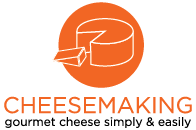Dosage and pack size
- Small size (5UA screw cap bottle) will inoculate 150 to 500 litres of milk depending on dosage used
- An approximate guide for usage is 1 Dash mini spoon or 1/8th spoon to 8 litres of milk
Types of Cheese Italian and Swiss can be used on
Comte, Tomme, Parmesan, Romano, Pecorino, Emmenthaler, Gruyere, Swiss, hard cheese, Tomme made with thermophile, Leerdammer, Appenzeller, Sbrinz, Asiago, Montasio,
Contains the following cultures
Lactococcus lactis subsp. Lactis
Lactococcus lactis subsp. Cremoris
Streptococcus thermophilus
Lactobacillus delbrueckii subsp. bulgaricus
Lactobacillus delbrueckii subsp. Lactis
Lactobacillus helveticus
Lactobacillus plantarum (NSLAB)
Lactobacillus rhamnoses (NSLAB)
Description
Italian and Swiss is a blend of several thermophilic and mesophilic starter cultures with approximately 85% thermophile and 15% mesophile. It is specifically formulated to provide a large diversity of cultures. The low level of mesophiles is to provide acidification when temperatures of the milk is between 30°C – 38°C for starter addition, rennet and cutting stages. The thermophiles at this stage are starting to ‘wake up’ then start producing acid during the cooking and scalding stages. The thermophiles in this mix can withstand cooking temperatures up to 54°C.
It is not the best option to use TPC style of cultures (or their similar varieties) for most Italian and Swiss styles of cheeses with high cooking temperatures. These cultures are very limited. Firstly, they do not have a mesophilic culture for initial acidity and flavour development and they do not have the variety of thermophiles for the high temperature cooking stage and thirdly they provide a high level of proteolysis which is not required for aged hard cheeses.
LH (Lactobacillus helveticus) (thermophile) is one of the thermophiles that has been added to this culture to break down the residual galactose that can cause browning defects during ripening. Additional LH should be strongly considered for hard Italian and Swiss styles of cheese.
- Flavour profile: 4 out 5
- Acid production: 2 out 5
- Resistance to bacteriophage: 5 out 5

